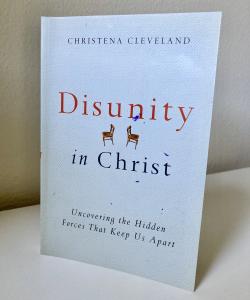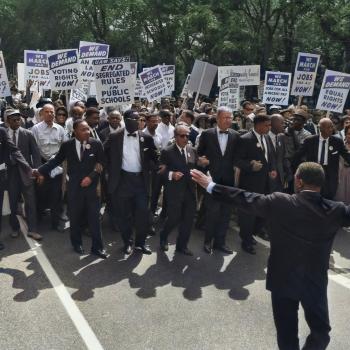You don’t have to scroll through social media too long to be overwhelmed by the barrage of divisive and demeaning language coming from all sides. It’s enough to make one wonder if there is any hope for a nation with “United” in its name. The most tragic aspect of this segregated reality is that the church is right at the center of it all.

This is the issue that social psychologist Christena Cleveland addresses in her book Disunity in Christ, and I think it’s an important one for us to explore. As Cleveland points out, there is a contradiction in what the church is called to be as the united body of Christ and what it actually looks like in real life.
She writes…
We represent Jesus well when we draw near to other believers, regardless of differences. This is how we show unbelievers Jesus’ heart. And this is how we invite them to join us in following him. We need to be reminded of Jesus’ words: “By this everyone will know that you are my disciples, if you love one another” (John 13:35). (pg. 17)
We are called to be a different type of community than what we see in the rest of the world. We’re supposed to be a body that is united in its diversity and that functions together, valuing and utilizing the strengths of its various parts. We’re supposed to be a community that is known by its love for everyone because we follow a Savior who lived with his unconditional and inclusive love on full display.
We saw in Jesus’ life how he crossed all sorts of barriers. He interacted with people from all different backgrounds and social groups – prostitutes and tax collectors, Pharisees and religious leaders, Jews and Samaritans and Romans. He brought together a band of disciples who were all across the board in their social groups and perspectives. In Jesus’ life and death, he tore down the dividing wall of hostility (Eph. 2:14), so that those who follow him could become a new humanity.
Though some of us may call for unity like this, it often rings hollow because…
…we rarely engage in meaningful interactions outside of our church groups. Instead, we tend to focus on the things that differentiate us from other groups, underestimate the richness and value that other groups bring to the kingdom of God and foster negative attitudes about other groups. If we interact with other groups at all, we usually do so at a distance and with at least a hint of suspicion. (pg. 26)
With her expertise in social psychology, Cleveland explains how and why we become so polarized. It’s actually very natural for us to create categories in our minds, which serve the purposes of preserving mental energy, helping us to recall information, and providing clarity. We create these categories for all sorts of information and also for the people that we encounter. Within these categories that we create, we develop our own ingroup, giving us a sense of belonging which is necessary for identity formation and self-esteem. But the shadow side is that we also develop outgroups along with biases of which we might not even be aware.
The sinister side effects of categorizing – erecting divisions between us and them, thinking that they are all the same, automatically thinking that they think poorly of us, recalling false memories of them, and inaccurately interpreting their behavior – are reinforcing the divide between different church groups. These processes need to be overcome in order to create meaningful interactions between different groups that break down unbiblical and unloving divisions. (pg. 60)
Our very natural tendencies have created a divide between us and them. Thankfully, there is hope for reconciliation and the unity that we seek as the body of Christ, but it takes some work. We cannot just make the call to come together and be nice. We have to be willing to address the issues that have led to the divides, which includes recognizing our own bias, taking responsibility for the ways that we have wronged others, and doing our part to make things right.
One important aspect of unity that Cleveland emphasizes is giving everyone an equal voice. We have to be honest about the different status levels and privileges that are held by various social groups and how that plays into the overall group dynamics. Those in places of privilege will have to intentionally invite, listen to, and respect the value of the voices of those who have historically been marginalized. We will never experience true unity if we don’t first pursue true justice and equity.
Cleveland challenges us with these words…
To put it bluntly, if you’re not willing to do the uncomfortable work of addressing and eradicating power and privilege differences in the church and beyond, you shouldn’t bother with unity and reconciliation. You can’t have the latter without the former. Like I said, reconciliation is not for the faint of heart. (Pg. 170)
If we truly want to repair the division that we see in the church, we have to be willing to put in the messy and uncomfortable work. We have to be willing to follow in the footsteps of the Lord whom we profess, the one who “pursued his followers in humility and love.” (pg. 191) It will be hard, just like Jesus promised, but it will be so worth it to experience God’s Kingdom in all its diverse beauty.
I highly recommend that you pick up Christena Cleveland’s book Disunity in Christ to learn more. It would be a great book to read with a group from your faith community and to work through the discussion questions at the end of each chapter.
Disclaimer: This post contains affiliate links. If you purchase a product from the provided links, I will receive a small commission at no additional expense to you.













